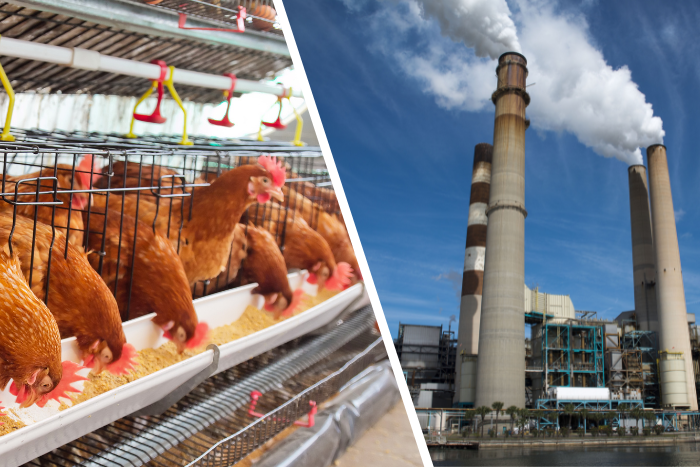Methane emissions from 29 meat and dairy companies are comparable with emissions from the top 100 fossil fuel corporations, according to the report by Greenpeace
As countries prepare for COP29 next month, activists all over the world are intent on pulling up one of the biggest methane emitters: meat and dairy industry. Some of the targeted corporations include Fonterra, Arla, Müller and Danish Crown.
Estimated methane emissions of this industry have now eclipsed emissions released by Big Oil, according to a new report by Greenpeace Nordic. The report titled ‘Turning down the heat: Pulling the Climate Emergency Brake on Big Meat and Dairy’ analysed emissions from 29 meat and dairy companies across the world. Incidentally, their methane emissions easily contest the top 100 fossil fuel corporations, found the report.
If left unchecked, the methane emissions from the meat and dairy sector could potentially increase global temperatures by 0.32°C by 2050, according to projections from the United Nations Food and Agriculture Organization’s (UN FAO), cited in the report.
But if appropriate action is taken, then this can turn into an opportunity. This would require systematic changes in production and consumption in high- and mid- income countries, found the report. Significant cooling can be achieved by 2050 if consumption patterns transition towards plant-based diets, following the EAT-Lancet Planetary Health diet.
Menacing methane
Meat and dairy production is the biggest source of methane emissions. And there’s scientific consensus that methane is 80 times more potent as a greenhouse gas than carbon dioxide.
But meat, dairy and animal feed corporations carry on business as usual, playing down their climate impacts with false solutions and shallow pledges, said the report. Governments, too, turn a blind eye, while giving them a free pass on climate action.
The report said that between 2005-2015, the dairy industry dropped its methane emissions intensity by 11%, but its absolute methane emissions increased by 18% in the same time period. This negates offsets from the reduction.
Also, livestock contributes over 90% of the methane emissions, but companies only pledge to reduce emissions intensity for this huge share of their total emissions, said the report.
“Governments have to step up to the plate and drive the investments and rules that will get us on this hopeful pathway. It’s a pathway that rights wrongs in the food and agriculture sector by driving out overproduction and overconsumption of meat and dairy. It requires governments to support farmers and workers in a just transition and gives all of us a fighting chance to limit global heating while saving millions of lives and livelihoods,” said Shefali Sharma, , senior agriculture campaigner for Greenpeace Nordic.
Dietary changes need of the hour?
Even a small reduction in global temperatures can significantly reduce harmful environmental impacts, said the report. Nearly 0.12°C reduction in global temperatures can be achieved by 2050, with a shift from meat and dairy overproduction and overconsumption to plant-based diets.
Essentially, this would translate to a 37% reduction of the anticipated mid-century heating of 0.32°C from meat and dairy alone, according to the report. Each 0.3°C projected warming prevented by the end of the century could reduce exposure to extreme heat for 410 million people.
“These are incredibly hopeful findings. For so long, we have tiptoed around big meat and dairy companies and their unfettered growth as if they are somehow exempt from making the drastic changes required of everyone else on this planet. It’s always either the farmer or the consumer who has to change, while these companies decide what farmers grow, what they are paid and what we eat. We have shown that the pathway is clear,” said Sharma.
About The Author
You may also like
Hyperlocal air quality monitoring identifies pollution hotspots in Indian cities: Study
Delhi-NCR most polluted region in India, Karnataka the cleanest air in India: Report
Outdoor air quality chronically underfunded, finds State of Global Air report
PM2.5 shortening average life expectancy of Delhi residents by almost 12 years
PM 2.5 air pollution increases anti-biotic resistance globally, India risk increases 2.5%


